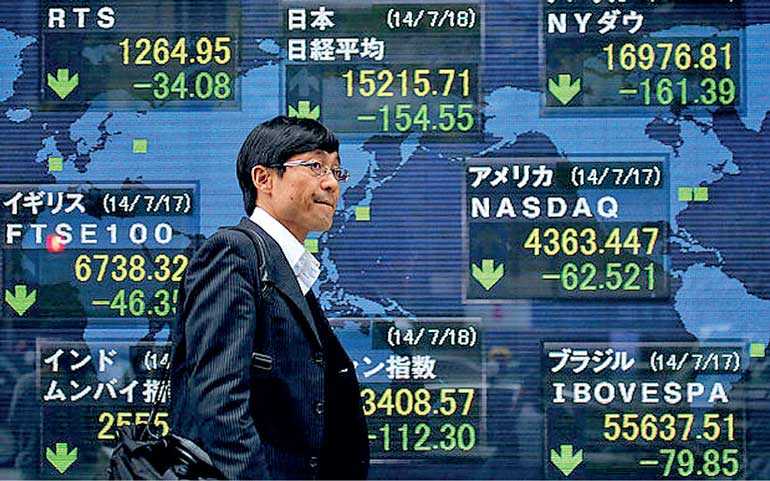Saturday Feb 21, 2026
Saturday Feb 21, 2026
Wednesday, 26 September 2018 00:00 - - {{hitsCtrl.values.hits}}
 TOKYO (Reuters): Asia stocks struggled on Tuesday as a fresh round of US-China tariffs and a surge in oil prices to near four-year highs added to worries about risks to global growth.
TOKYO (Reuters): Asia stocks struggled on Tuesday as a fresh round of US-China tariffs and a surge in oil prices to near four-year highs added to worries about risks to global growth.
Spreadbetters expected European stocks to open on the defensive, with Britain’s FTSE giving up 0.1%, Germany’s DAX starting unchanged and France’s CAC losing 0.2%.
MSCI’s broadest index of Asia-Pacific shares outside Japan edged down 0.15%. But Japan’s Nikkei bucked the trend and edged up nearly 0.2%.
The Shanghai Composite Index .SSEC dropped 0.7% and Australian stocks eased 0.1%. Hong Kong markets were closed for a holiday. China and the United States imposed new tariffs on each other’s goods on Monday and neither side looks to be in the mood to compromise, raising the risk of a protracted battle that could chill investment and disrupt global trade. The Dow fell about 0.7% and the S&P 500 .SPX slipped 0.35% overnight. The tense backdrop added to the general caution ahead of an expected interest rate hike by the Federal Reserve this week and uncertainty over the future of U.S. Deputy Attorney General Rod Rosenstein. Rosenstein oversees the special counsel investigation into Russia’s role in the 2016 presidential election. The Fed begins its two-day policy meeting later on Tuesday. US equities had made strong gains last week as investors had hoped the United States and China would find a way out of the trade impasse.
“Wall Street weakness amid the latest flare up in trade conflict concerns is a negative factor for equities. Some markets, like Japan’s, have positive factors to fall back on like the weaker yen, but such support could be negated if the Chinese market is hit by volatility,” said Masahiro Ichikawa, senior strategist at Sumitomo Mitsui Asset Management in Tokyo.
In currencies, the euro stood little changed at $1.1742. The single currency had surged to a 3-1/2-month peak of $1.1815 on Monday after European Central Bank chief Mario Draghi said he sees a vigorous pickup in euro zone inflation, backing moves toward unwinding an ECB asset-purchase program meant to stimulate the economy. Ahead of the Fed’s expected rate hike, the greenback climbed to a two-month peak of 113.00 yen before easing to 112.915.
The dollar index against a basket of six major currencies edged up 0.15% to 94.329.
China’s yuan was a shade weaker at 6.8641 per dollar in onshore trade. It dipped in offshore trade on Monday, which was a holiday in mainland markets, after reports that Beijing was scrapping plans to attend trade talks this week.
The Australian dollar, a proxy of China-related trades and a gauge of broad risk appetite, retreated 0.15% to $0.7241 after shedding 0.5% on Monday. Brent crude oil futures hovered near $81.48, the highest since November 2014 scaled overnight.
Oil prices had rallied more than 3% on Monday after Russian and OPEC leader Saudi Arabia ruled out on Sunday any immediate, additional increase in crude output, effectively rebuffing US President Donald Trump’s calls for action to cool the market.
“We would expect oil to trend higher in the coming weeks... This is because OPEC have essentially ignored President Trump’s call to raise output to help lower prices,” said Ashley Kelty, oil and gas research analyst at financial services firm Cantor Fitzgerald.
“We don’t believe OPEC can actually raise output significantly in the near term, as the physical spare capacity in the system is not that high,” Kelty said.
Furthermore, the United States from November will target Iran’s oil exports with sanctions, and Washington is putting pressure on governments and companies around the world to fall in line and cut purchases from Tehran.